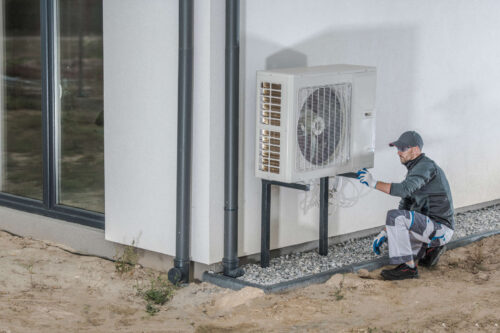Introduction:
In the ongoing pursuit of sustainable energy solutions, the spotlight increasingly turns to technologies that leverage the power of nature while minimizing environmental impact. One such innovation that has gained significant traction in recent years is the air source heat pump. This transformative technology offers a myriad of benefits, ranging from energy efficiency to reduced carbon emissions, making it a compelling choice for both residential and commercial heating and cooling needs.
Understanding Air Source Heat Pumps:
At its core, an air source heat pump operates on the principle of transferring heat from the outdoor air to either warm or cool indoor spaces. This process involves the compression and expansion of refrigerant gases, facilitating the exchange of thermal energy between the air inside a building and the ambient air outside. Unlike traditional heating systems that rely on fossil fuels, such as natural gas or oil, air source heat pumps harness renewable energy sources, making them a greener alternative with lower carbon footprints.
Energy Efficiency:
One of the most notable advantages of air source heat pumps is their exceptional energy efficiency. By harnessing ambient heat from the surrounding air, these systems can deliver up to three times more energy than they consume, offering significant savings on heating and cooling costs. Moreover, advancements in technology have led to the development of highly efficient heat pump models that operate even in extremely cold climates, making them suitable for a wide range of geographical õhksoojuspumba projekt regions.
Versatility and Year-Round Comfort:
Unlike traditional HVAC systems, which often require separate units for heating and cooling, air source heat pumps offer year-round comfort with a single integrated system. During the colder months, they extract heat from the outdoor air and transfer it indoors to warm the living or working space. Conversely, in warmer weather, the process is reversed, with the heat pump extracting heat from indoors and expelling it outside, effectively cooling the indoor environment. This versatility not only simplifies HVAC installations but also enhances overall comfort and convenience for occupants.
Environmental Sustainability:
In an era marked by growing concerns over climate change and environmental degradation, the adoption of sustainable technologies has become imperative. Air source heat pumps play a crucial role in this regard by significantly reducing greenhouse gas emissions associated with heating and cooling operations. By minimizing reliance on fossil fuels, they help mitigate environmental impact while promoting a cleaner, healthier planet for future generations.
Financial Incentives and Long-Term Savings:
Governments and utilities worldwide are increasingly offering financial incentives and rebates to encourage the adoption of renewable energy technologies, including air source heat pumps. These incentives, coupled with the long-term energy savings offered by heat pump systems, make them an attractive investment for homeowners and businesses alike. Additionally, the durability and longevity of air source heat pumps contribute to lower maintenance costs and greater overall value over their operational lifespan.